Literature Review: Impact of IFRS Implementation in Various Economies
VerifiedAdded on 2023/01/17
|14
|4687
|37
Literature Review
AI Summary
This literature review examines the impact of International Financial Reporting Standards (IFRS) implementation across various economies. It analyzes four key articles, exploring the effects of IFRS adoption on accounting quality, earning management, timely loss recognition, and value relevance in countries like China, Australia, South Africa, and Greece. The review addresses research questions regarding the relevance of IFRS in different market contexts, the impact on accounting practices, and the comparability of financial statements. It delves into the theoretical frameworks underpinning the studies, including the challenges to the universal applicability of IFRS and the impact on comparability. The review also identifies key motivating literature and the research methods employed, such as variance analysis and coefficient estimates. The findings highlight diverse impacts of IFRS, prompting discussions on the benefits and drawbacks of IFRS implementation, the role of local standards, and the implications for investors and financial decision-making.

LITERATURE REVIEW
Paraphrase This Document
Need a fresh take? Get an instant paraphrase of this document with our AI Paraphraser
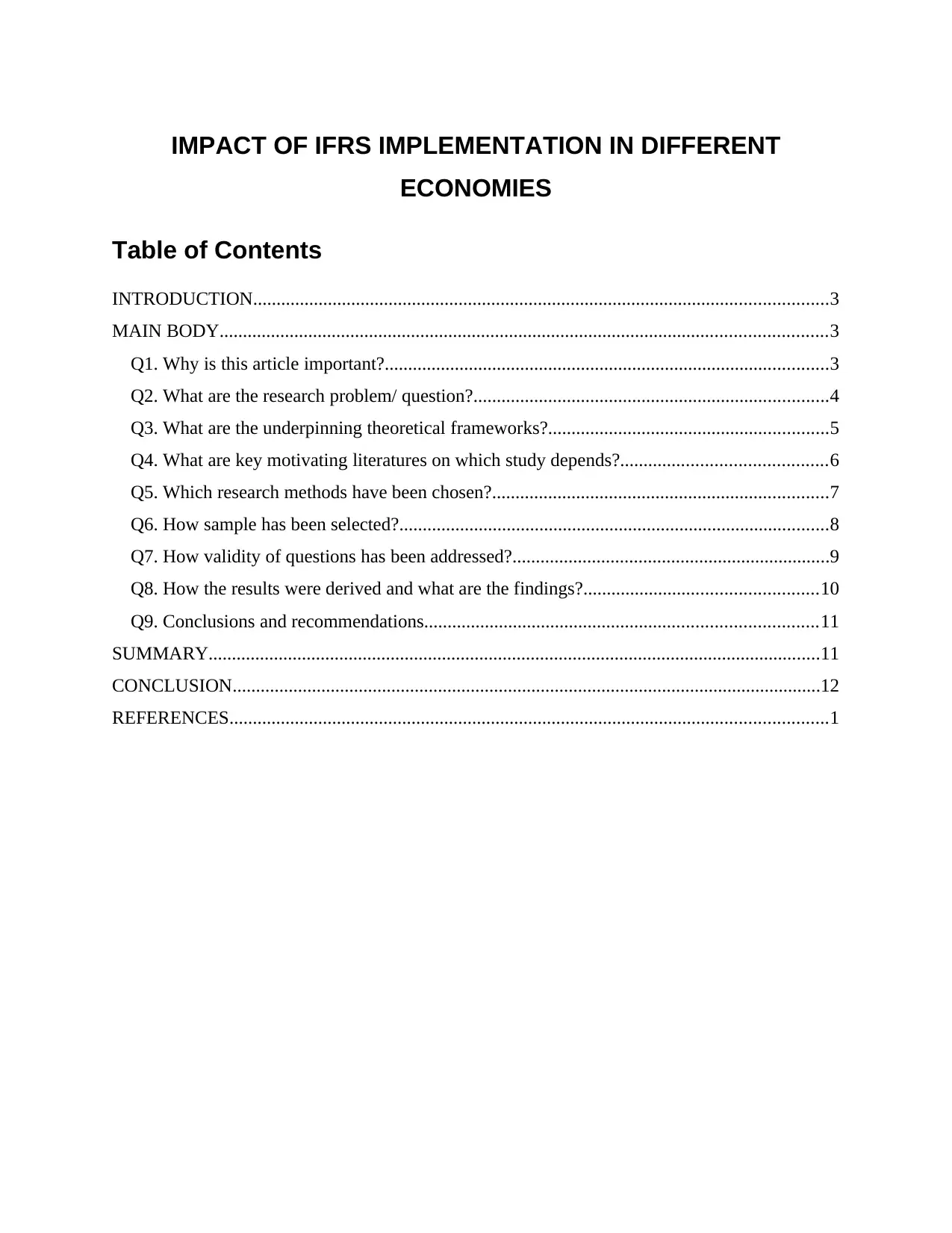
IMPACT OF IFRS IMPLEMENTATION IN DIFFERENT
ECONOMIES
Table of Contents
INTRODUCTION...........................................................................................................................3
MAIN BODY..................................................................................................................................3
Q1. Why is this article important?...............................................................................................3
Q2. What are the research problem/ question?............................................................................4
Q3. What are the underpinning theoretical frameworks?............................................................5
Q4. What are key motivating literatures on which study depends?............................................6
Q5. Which research methods have been chosen?........................................................................7
Q6. How sample has been selected?............................................................................................8
Q7. How validity of questions has been addressed?....................................................................9
Q8. How the results were derived and what are the findings?..................................................10
Q9. Conclusions and recommendations....................................................................................11
SUMMARY...................................................................................................................................11
CONCLUSION..............................................................................................................................12
REFERENCES................................................................................................................................1
ECONOMIES
Table of Contents
INTRODUCTION...........................................................................................................................3
MAIN BODY..................................................................................................................................3
Q1. Why is this article important?...............................................................................................3
Q2. What are the research problem/ question?............................................................................4
Q3. What are the underpinning theoretical frameworks?............................................................5
Q4. What are key motivating literatures on which study depends?............................................6
Q5. Which research methods have been chosen?........................................................................7
Q6. How sample has been selected?............................................................................................8
Q7. How validity of questions has been addressed?....................................................................9
Q8. How the results were derived and what are the findings?..................................................10
Q9. Conclusions and recommendations....................................................................................11
SUMMARY...................................................................................................................................11
CONCLUSION..............................................................................................................................12
REFERENCES................................................................................................................................1
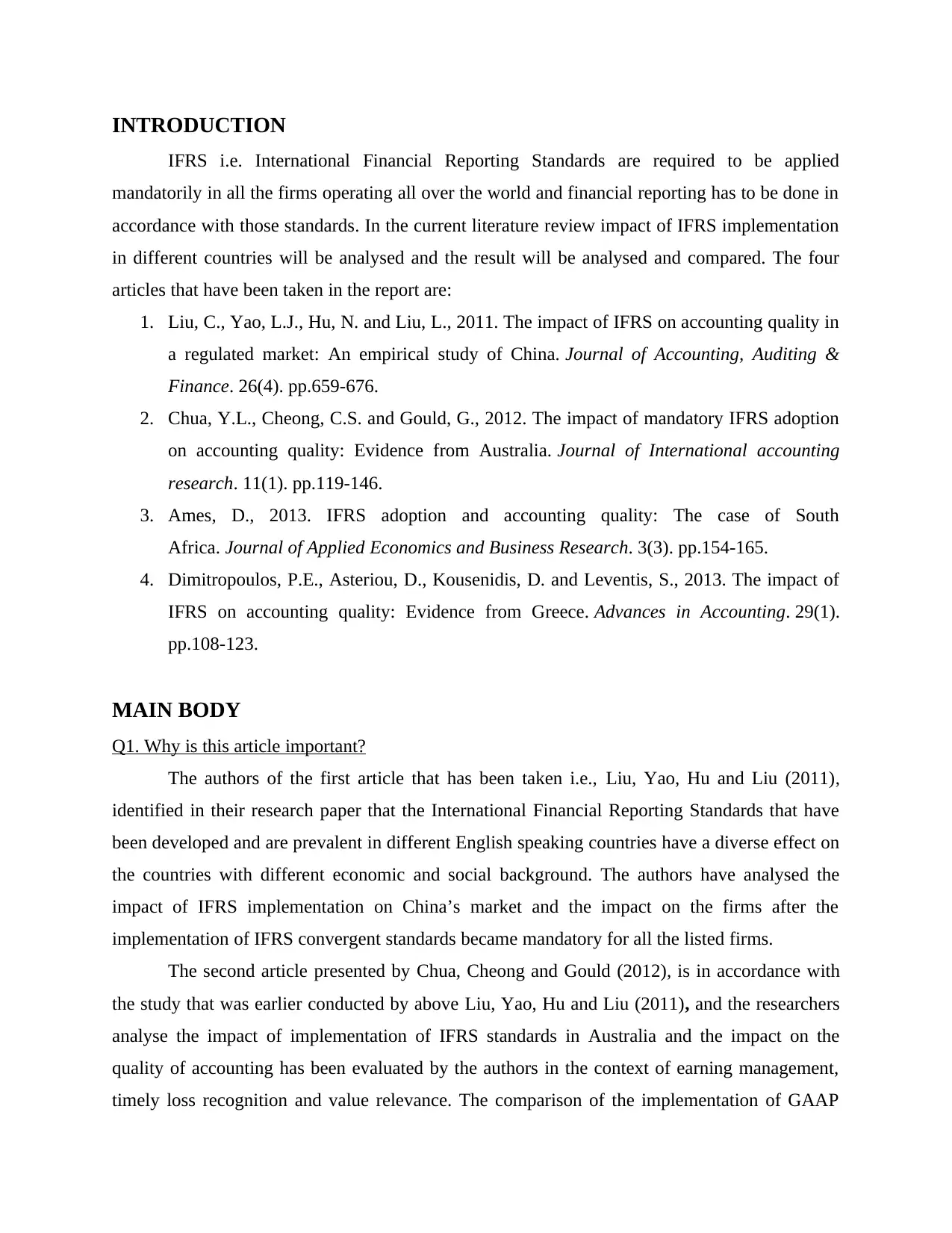
INTRODUCTION
IFRS i.e. International Financial Reporting Standards are required to be applied
mandatorily in all the firms operating all over the world and financial reporting has to be done in
accordance with those standards. In the current literature review impact of IFRS implementation
in different countries will be analysed and the result will be analysed and compared. The four
articles that have been taken in the report are:
1. Liu, C., Yao, L.J., Hu, N. and Liu, L., 2011. The impact of IFRS on accounting quality in
a regulated market: An empirical study of China. Journal of Accounting, Auditing &
Finance. 26(4). pp.659-676.
2. Chua, Y.L., Cheong, C.S. and Gould, G., 2012. The impact of mandatory IFRS adoption
on accounting quality: Evidence from Australia. Journal of International accounting
research. 11(1). pp.119-146.
3. Ames, D., 2013. IFRS adoption and accounting quality: The case of South
Africa. Journal of Applied Economics and Business Research. 3(3). pp.154-165.
4. Dimitropoulos, P.E., Asteriou, D., Kousenidis, D. and Leventis, S., 2013. The impact of
IFRS on accounting quality: Evidence from Greece. Advances in Accounting. 29(1).
pp.108-123.
MAIN BODY
Q1. Why is this article important?
The authors of the first article that has been taken i.e., Liu, Yao, Hu and Liu (2011),
identified in their research paper that the International Financial Reporting Standards that have
been developed and are prevalent in different English speaking countries have a diverse effect on
the countries with different economic and social background. The authors have analysed the
impact of IFRS implementation on China’s market and the impact on the firms after the
implementation of IFRS convergent standards became mandatory for all the listed firms.
The second article presented by Chua, Cheong and Gould (2012), is in accordance with
the study that was earlier conducted by above Liu, Yao, Hu and Liu (2011), and the researchers
analyse the impact of implementation of IFRS standards in Australia and the impact on the
quality of accounting has been evaluated by the authors in the context of earning management,
timely loss recognition and value relevance. The comparison of the implementation of GAAP
IFRS i.e. International Financial Reporting Standards are required to be applied
mandatorily in all the firms operating all over the world and financial reporting has to be done in
accordance with those standards. In the current literature review impact of IFRS implementation
in different countries will be analysed and the result will be analysed and compared. The four
articles that have been taken in the report are:
1. Liu, C., Yao, L.J., Hu, N. and Liu, L., 2011. The impact of IFRS on accounting quality in
a regulated market: An empirical study of China. Journal of Accounting, Auditing &
Finance. 26(4). pp.659-676.
2. Chua, Y.L., Cheong, C.S. and Gould, G., 2012. The impact of mandatory IFRS adoption
on accounting quality: Evidence from Australia. Journal of International accounting
research. 11(1). pp.119-146.
3. Ames, D., 2013. IFRS adoption and accounting quality: The case of South
Africa. Journal of Applied Economics and Business Research. 3(3). pp.154-165.
4. Dimitropoulos, P.E., Asteriou, D., Kousenidis, D. and Leventis, S., 2013. The impact of
IFRS on accounting quality: Evidence from Greece. Advances in Accounting. 29(1).
pp.108-123.
MAIN BODY
Q1. Why is this article important?
The authors of the first article that has been taken i.e., Liu, Yao, Hu and Liu (2011),
identified in their research paper that the International Financial Reporting Standards that have
been developed and are prevalent in different English speaking countries have a diverse effect on
the countries with different economic and social background. The authors have analysed the
impact of IFRS implementation on China’s market and the impact on the firms after the
implementation of IFRS convergent standards became mandatory for all the listed firms.
The second article presented by Chua, Cheong and Gould (2012), is in accordance with
the study that was earlier conducted by above Liu, Yao, Hu and Liu (2011), and the researchers
analyse the impact of implementation of IFRS standards in Australia and the impact on the
quality of accounting has been evaluated by the authors in the context of earning management,
timely loss recognition and value relevance. The comparison of the implementation of GAAP
⊘ This is a preview!⊘
Do you want full access?
Subscribe today to unlock all pages.

Trusted by 1+ million students worldwide
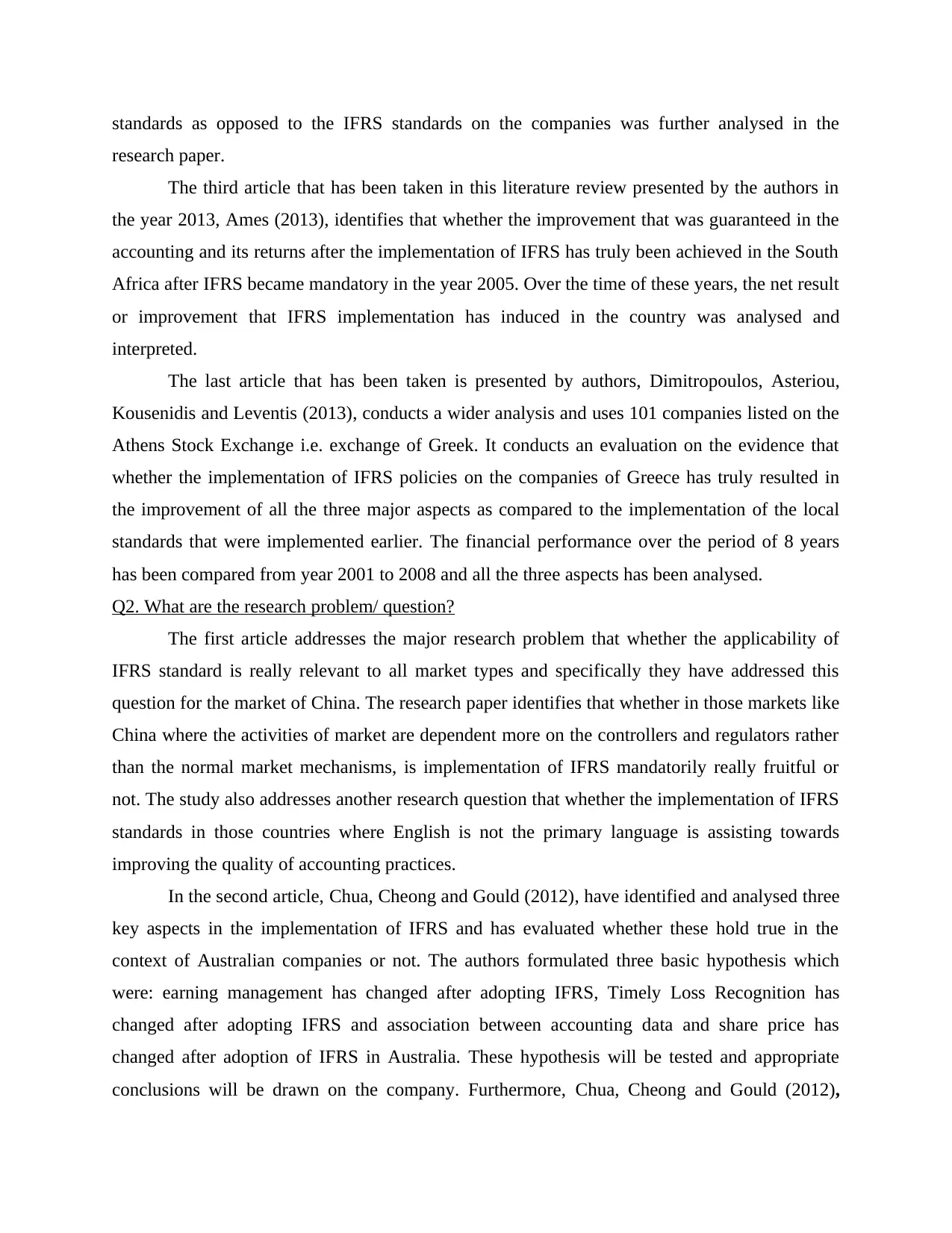
standards as opposed to the IFRS standards on the companies was further analysed in the
research paper.
The third article that has been taken in this literature review presented by the authors in
the year 2013, Ames (2013), identifies that whether the improvement that was guaranteed in the
accounting and its returns after the implementation of IFRS has truly been achieved in the South
Africa after IFRS became mandatory in the year 2005. Over the time of these years, the net result
or improvement that IFRS implementation has induced in the country was analysed and
interpreted.
The last article that has been taken is presented by authors, Dimitropoulos, Asteriou,
Kousenidis and Leventis (2013), conducts a wider analysis and uses 101 companies listed on the
Athens Stock Exchange i.e. exchange of Greek. It conducts an evaluation on the evidence that
whether the implementation of IFRS policies on the companies of Greece has truly resulted in
the improvement of all the three major aspects as compared to the implementation of the local
standards that were implemented earlier. The financial performance over the period of 8 years
has been compared from year 2001 to 2008 and all the three aspects has been analysed.
Q2. What are the research problem/ question?
The first article addresses the major research problem that whether the applicability of
IFRS standard is really relevant to all market types and specifically they have addressed this
question for the market of China. The research paper identifies that whether in those markets like
China where the activities of market are dependent more on the controllers and regulators rather
than the normal market mechanisms, is implementation of IFRS mandatorily really fruitful or
not. The study also addresses another research question that whether the implementation of IFRS
standards in those countries where English is not the primary language is assisting towards
improving the quality of accounting practices.
In the second article, Chua, Cheong and Gould (2012), have identified and analysed three
key aspects in the implementation of IFRS and has evaluated whether these hold true in the
context of Australian companies or not. The authors formulated three basic hypothesis which
were: earning management has changed after adopting IFRS, Timely Loss Recognition has
changed after adopting IFRS and association between accounting data and share price has
changed after adoption of IFRS in Australia. These hypothesis will be tested and appropriate
conclusions will be drawn on the company. Furthermore, Chua, Cheong and Gould (2012),
research paper.
The third article that has been taken in this literature review presented by the authors in
the year 2013, Ames (2013), identifies that whether the improvement that was guaranteed in the
accounting and its returns after the implementation of IFRS has truly been achieved in the South
Africa after IFRS became mandatory in the year 2005. Over the time of these years, the net result
or improvement that IFRS implementation has induced in the country was analysed and
interpreted.
The last article that has been taken is presented by authors, Dimitropoulos, Asteriou,
Kousenidis and Leventis (2013), conducts a wider analysis and uses 101 companies listed on the
Athens Stock Exchange i.e. exchange of Greek. It conducts an evaluation on the evidence that
whether the implementation of IFRS policies on the companies of Greece has truly resulted in
the improvement of all the three major aspects as compared to the implementation of the local
standards that were implemented earlier. The financial performance over the period of 8 years
has been compared from year 2001 to 2008 and all the three aspects has been analysed.
Q2. What are the research problem/ question?
The first article addresses the major research problem that whether the applicability of
IFRS standard is really relevant to all market types and specifically they have addressed this
question for the market of China. The research paper identifies that whether in those markets like
China where the activities of market are dependent more on the controllers and regulators rather
than the normal market mechanisms, is implementation of IFRS mandatorily really fruitful or
not. The study also addresses another research question that whether the implementation of IFRS
standards in those countries where English is not the primary language is assisting towards
improving the quality of accounting practices.
In the second article, Chua, Cheong and Gould (2012), have identified and analysed three
key aspects in the implementation of IFRS and has evaluated whether these hold true in the
context of Australian companies or not. The authors formulated three basic hypothesis which
were: earning management has changed after adopting IFRS, Timely Loss Recognition has
changed after adopting IFRS and association between accounting data and share price has
changed after adoption of IFRS in Australia. These hypothesis will be tested and appropriate
conclusions will be drawn on the company. Furthermore, Chua, Cheong and Gould (2012),
Paraphrase This Document
Need a fresh take? Get an instant paraphrase of this document with our AI Paraphraser
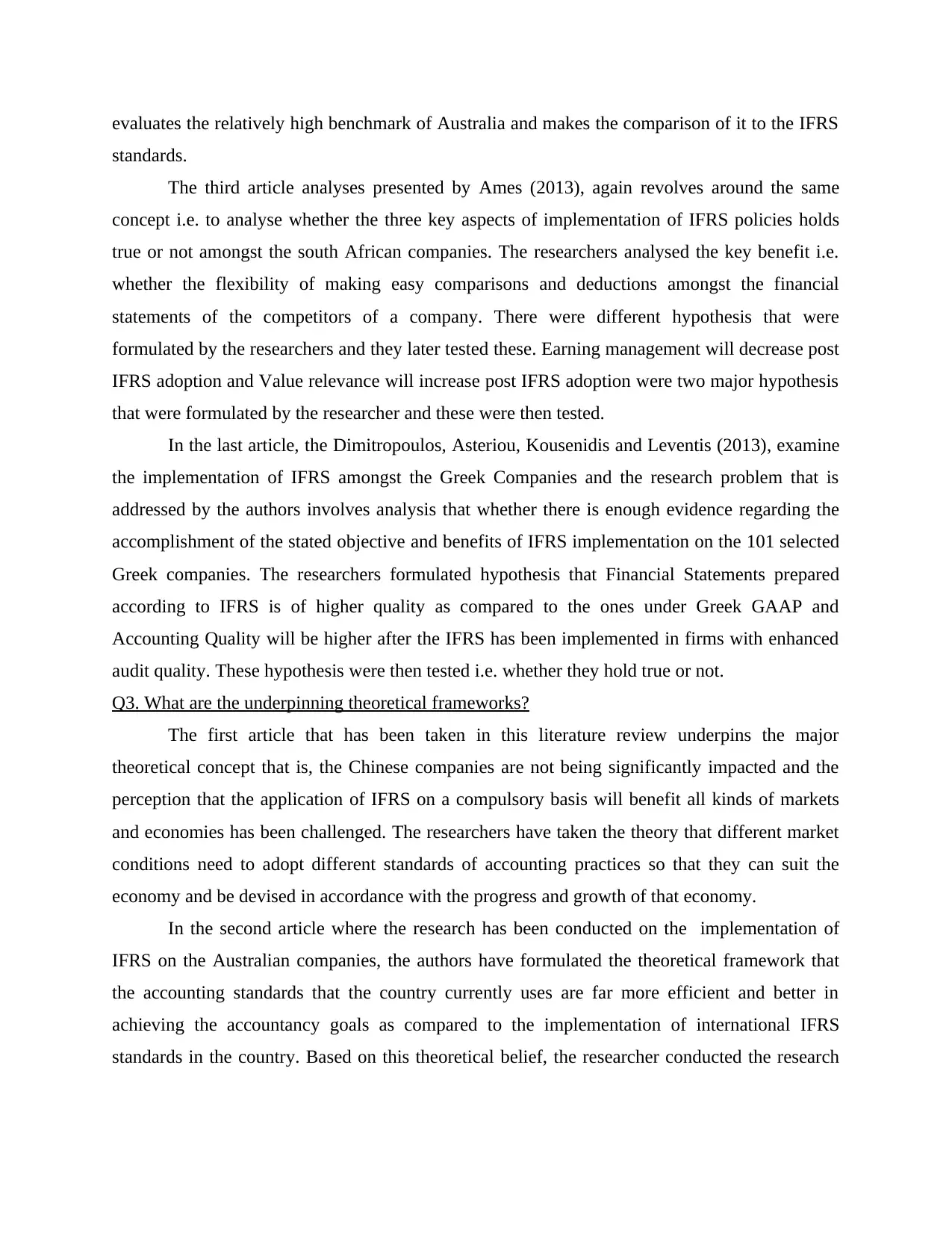
evaluates the relatively high benchmark of Australia and makes the comparison of it to the IFRS
standards.
The third article analyses presented by Ames (2013), again revolves around the same
concept i.e. to analyse whether the three key aspects of implementation of IFRS policies holds
true or not amongst the south African companies. The researchers analysed the key benefit i.e.
whether the flexibility of making easy comparisons and deductions amongst the financial
statements of the competitors of a company. There were different hypothesis that were
formulated by the researchers and they later tested these. Earning management will decrease post
IFRS adoption and Value relevance will increase post IFRS adoption were two major hypothesis
that were formulated by the researcher and these were then tested.
In the last article, the Dimitropoulos, Asteriou, Kousenidis and Leventis (2013), examine
the implementation of IFRS amongst the Greek Companies and the research problem that is
addressed by the authors involves analysis that whether there is enough evidence regarding the
accomplishment of the stated objective and benefits of IFRS implementation on the 101 selected
Greek companies. The researchers formulated hypothesis that Financial Statements prepared
according to IFRS is of higher quality as compared to the ones under Greek GAAP and
Accounting Quality will be higher after the IFRS has been implemented in firms with enhanced
audit quality. These hypothesis were then tested i.e. whether they hold true or not.
Q3. What are the underpinning theoretical frameworks?
The first article that has been taken in this literature review underpins the major
theoretical concept that is, the Chinese companies are not being significantly impacted and the
perception that the application of IFRS on a compulsory basis will benefit all kinds of markets
and economies has been challenged. The researchers have taken the theory that different market
conditions need to adopt different standards of accounting practices so that they can suit the
economy and be devised in accordance with the progress and growth of that economy.
In the second article where the research has been conducted on the implementation of
IFRS on the Australian companies, the authors have formulated the theoretical framework that
the accounting standards that the country currently uses are far more efficient and better in
achieving the accountancy goals as compared to the implementation of international IFRS
standards in the country. Based on this theoretical belief, the researcher conducted the research
standards.
The third article analyses presented by Ames (2013), again revolves around the same
concept i.e. to analyse whether the three key aspects of implementation of IFRS policies holds
true or not amongst the south African companies. The researchers analysed the key benefit i.e.
whether the flexibility of making easy comparisons and deductions amongst the financial
statements of the competitors of a company. There were different hypothesis that were
formulated by the researchers and they later tested these. Earning management will decrease post
IFRS adoption and Value relevance will increase post IFRS adoption were two major hypothesis
that were formulated by the researcher and these were then tested.
In the last article, the Dimitropoulos, Asteriou, Kousenidis and Leventis (2013), examine
the implementation of IFRS amongst the Greek Companies and the research problem that is
addressed by the authors involves analysis that whether there is enough evidence regarding the
accomplishment of the stated objective and benefits of IFRS implementation on the 101 selected
Greek companies. The researchers formulated hypothesis that Financial Statements prepared
according to IFRS is of higher quality as compared to the ones under Greek GAAP and
Accounting Quality will be higher after the IFRS has been implemented in firms with enhanced
audit quality. These hypothesis were then tested i.e. whether they hold true or not.
Q3. What are the underpinning theoretical frameworks?
The first article that has been taken in this literature review underpins the major
theoretical concept that is, the Chinese companies are not being significantly impacted and the
perception that the application of IFRS on a compulsory basis will benefit all kinds of markets
and economies has been challenged. The researchers have taken the theory that different market
conditions need to adopt different standards of accounting practices so that they can suit the
economy and be devised in accordance with the progress and growth of that economy.
In the second article where the research has been conducted on the implementation of
IFRS on the Australian companies, the authors have formulated the theoretical framework that
the accounting standards that the country currently uses are far more efficient and better in
achieving the accountancy goals as compared to the implementation of international IFRS
standards in the country. Based on this theoretical belief, the researcher conducted the research
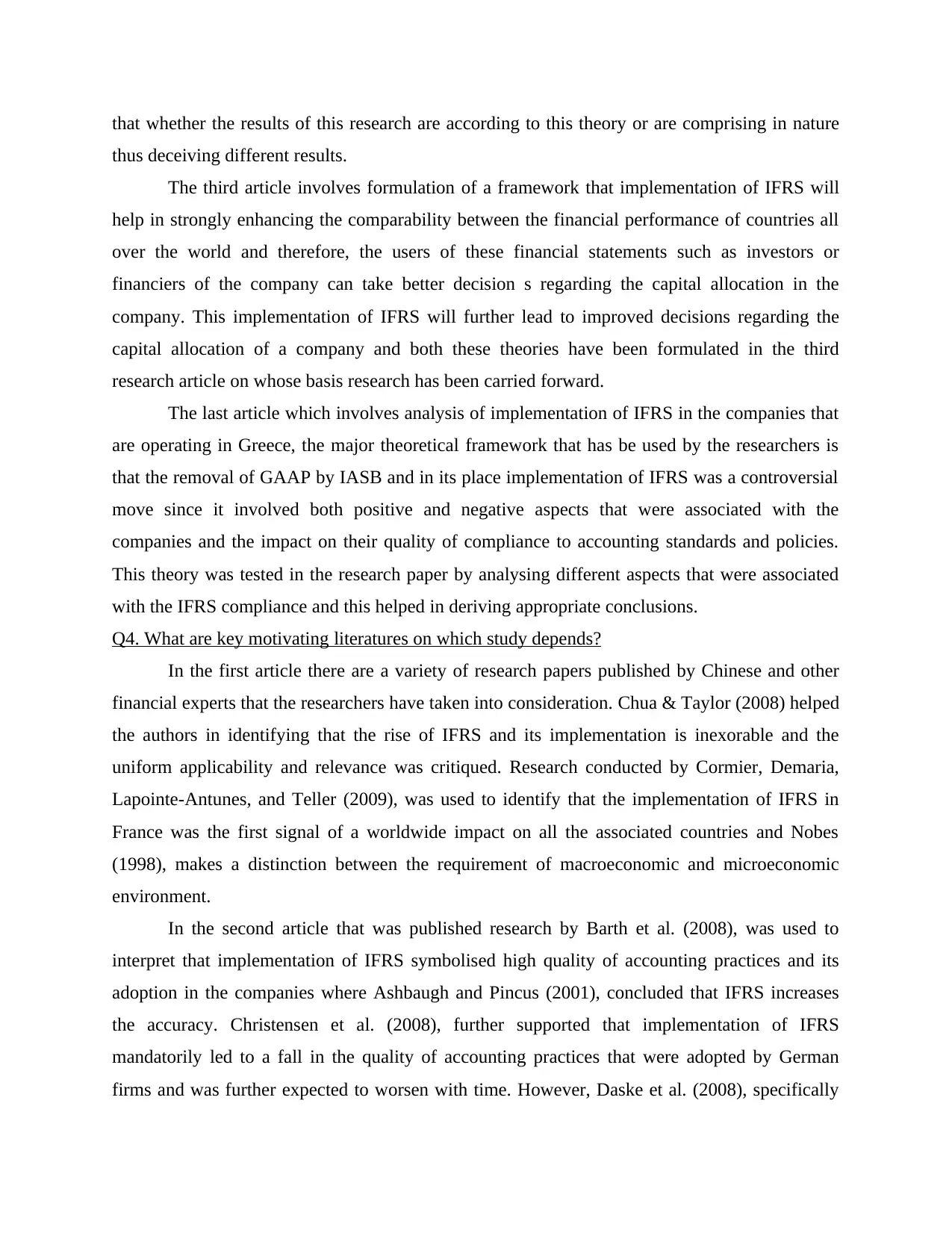
that whether the results of this research are according to this theory or are comprising in nature
thus deceiving different results.
The third article involves formulation of a framework that implementation of IFRS will
help in strongly enhancing the comparability between the financial performance of countries all
over the world and therefore, the users of these financial statements such as investors or
financiers of the company can take better decision s regarding the capital allocation in the
company. This implementation of IFRS will further lead to improved decisions regarding the
capital allocation of a company and both these theories have been formulated in the third
research article on whose basis research has been carried forward.
The last article which involves analysis of implementation of IFRS in the companies that
are operating in Greece, the major theoretical framework that has be used by the researchers is
that the removal of GAAP by IASB and in its place implementation of IFRS was a controversial
move since it involved both positive and negative aspects that were associated with the
companies and the impact on their quality of compliance to accounting standards and policies.
This theory was tested in the research paper by analysing different aspects that were associated
with the IFRS compliance and this helped in deriving appropriate conclusions.
Q4. What are key motivating literatures on which study depends?
In the first article there are a variety of research papers published by Chinese and other
financial experts that the researchers have taken into consideration. Chua & Taylor (2008) helped
the authors in identifying that the rise of IFRS and its implementation is inexorable and the
uniform applicability and relevance was critiqued. Research conducted by Cormier, Demaria,
Lapointe-Antunes, and Teller (2009), was used to identify that the implementation of IFRS in
France was the first signal of a worldwide impact on all the associated countries and Nobes
(1998), makes a distinction between the requirement of macroeconomic and microeconomic
environment.
In the second article that was published research by Barth et al. (2008), was used to
interpret that implementation of IFRS symbolised high quality of accounting practices and its
adoption in the companies where Ashbaugh and Pincus (2001), concluded that IFRS increases
the accuracy. Christensen et al. (2008), further supported that implementation of IFRS
mandatorily led to a fall in the quality of accounting practices that were adopted by German
firms and was further expected to worsen with time. However, Daske et al. (2008), specifically
thus deceiving different results.
The third article involves formulation of a framework that implementation of IFRS will
help in strongly enhancing the comparability between the financial performance of countries all
over the world and therefore, the users of these financial statements such as investors or
financiers of the company can take better decision s regarding the capital allocation in the
company. This implementation of IFRS will further lead to improved decisions regarding the
capital allocation of a company and both these theories have been formulated in the third
research article on whose basis research has been carried forward.
The last article which involves analysis of implementation of IFRS in the companies that
are operating in Greece, the major theoretical framework that has be used by the researchers is
that the removal of GAAP by IASB and in its place implementation of IFRS was a controversial
move since it involved both positive and negative aspects that were associated with the
companies and the impact on their quality of compliance to accounting standards and policies.
This theory was tested in the research paper by analysing different aspects that were associated
with the IFRS compliance and this helped in deriving appropriate conclusions.
Q4. What are key motivating literatures on which study depends?
In the first article there are a variety of research papers published by Chinese and other
financial experts that the researchers have taken into consideration. Chua & Taylor (2008) helped
the authors in identifying that the rise of IFRS and its implementation is inexorable and the
uniform applicability and relevance was critiqued. Research conducted by Cormier, Demaria,
Lapointe-Antunes, and Teller (2009), was used to identify that the implementation of IFRS in
France was the first signal of a worldwide impact on all the associated countries and Nobes
(1998), makes a distinction between the requirement of macroeconomic and microeconomic
environment.
In the second article that was published research by Barth et al. (2008), was used to
interpret that implementation of IFRS symbolised high quality of accounting practices and its
adoption in the companies where Ashbaugh and Pincus (2001), concluded that IFRS increases
the accuracy. Christensen et al. (2008), further supported that implementation of IFRS
mandatorily led to a fall in the quality of accounting practices that were adopted by German
firms and was further expected to worsen with time. However, Daske et al. (2008), specifically
⊘ This is a preview!⊘
Do you want full access?
Subscribe today to unlock all pages.

Trusted by 1+ million students worldwide
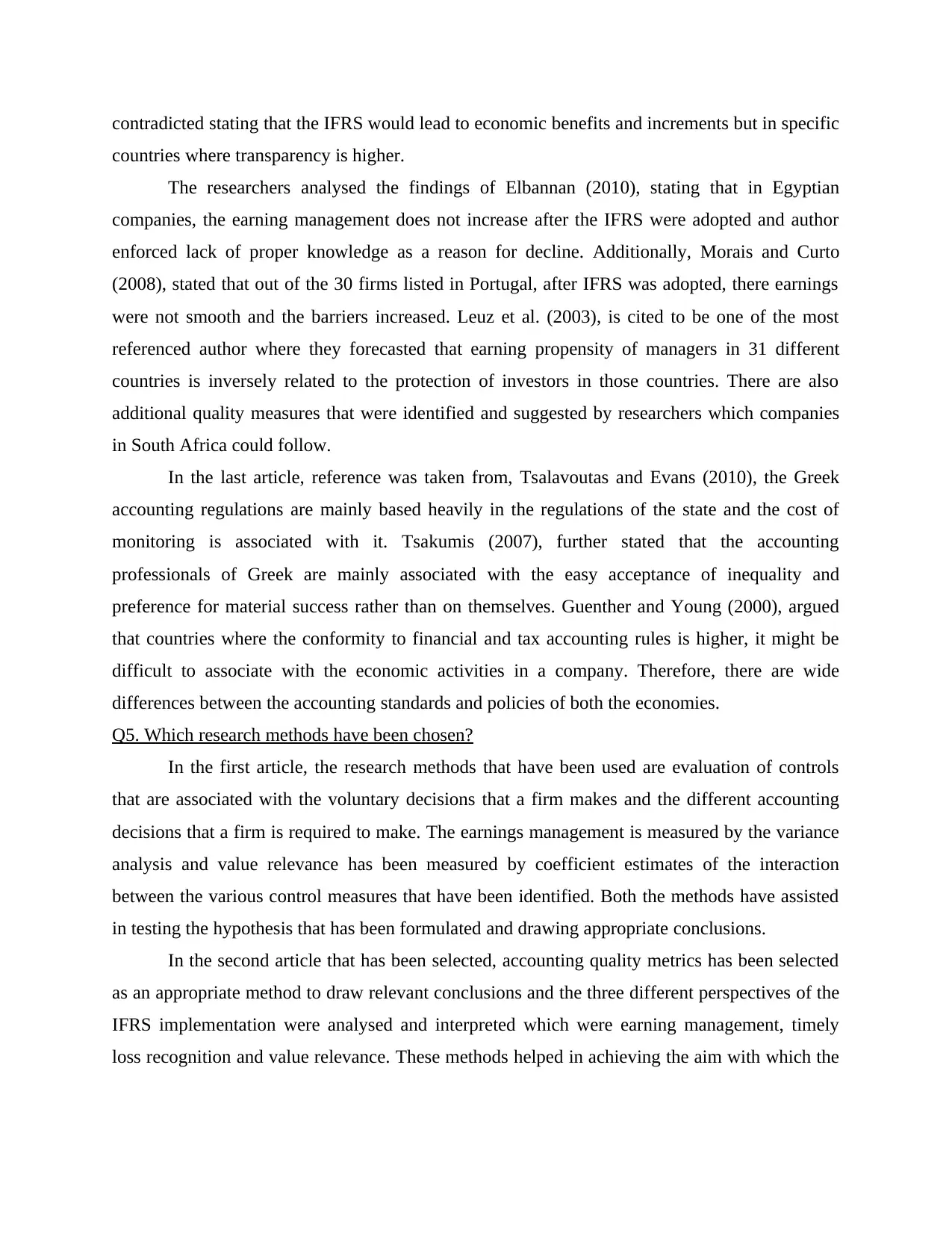
contradicted stating that the IFRS would lead to economic benefits and increments but in specific
countries where transparency is higher.
The researchers analysed the findings of Elbannan (2010), stating that in Egyptian
companies, the earning management does not increase after the IFRS were adopted and author
enforced lack of proper knowledge as a reason for decline. Additionally, Morais and Curto
(2008), stated that out of the 30 firms listed in Portugal, after IFRS was adopted, there earnings
were not smooth and the barriers increased. Leuz et al. (2003), is cited to be one of the most
referenced author where they forecasted that earning propensity of managers in 31 different
countries is inversely related to the protection of investors in those countries. There are also
additional quality measures that were identified and suggested by researchers which companies
in South Africa could follow.
In the last article, reference was taken from, Tsalavoutas and Evans (2010), the Greek
accounting regulations are mainly based heavily in the regulations of the state and the cost of
monitoring is associated with it. Tsakumis (2007), further stated that the accounting
professionals of Greek are mainly associated with the easy acceptance of inequality and
preference for material success rather than on themselves. Guenther and Young (2000), argued
that countries where the conformity to financial and tax accounting rules is higher, it might be
difficult to associate with the economic activities in a company. Therefore, there are wide
differences between the accounting standards and policies of both the economies.
Q5. Which research methods have been chosen?
In the first article, the research methods that have been used are evaluation of controls
that are associated with the voluntary decisions that a firm makes and the different accounting
decisions that a firm is required to make. The earnings management is measured by the variance
analysis and value relevance has been measured by coefficient estimates of the interaction
between the various control measures that have been identified. Both the methods have assisted
in testing the hypothesis that has been formulated and drawing appropriate conclusions.
In the second article that has been selected, accounting quality metrics has been selected
as an appropriate method to draw relevant conclusions and the three different perspectives of the
IFRS implementation were analysed and interpreted which were earning management, timely
loss recognition and value relevance. These methods helped in achieving the aim with which the
countries where transparency is higher.
The researchers analysed the findings of Elbannan (2010), stating that in Egyptian
companies, the earning management does not increase after the IFRS were adopted and author
enforced lack of proper knowledge as a reason for decline. Additionally, Morais and Curto
(2008), stated that out of the 30 firms listed in Portugal, after IFRS was adopted, there earnings
were not smooth and the barriers increased. Leuz et al. (2003), is cited to be one of the most
referenced author where they forecasted that earning propensity of managers in 31 different
countries is inversely related to the protection of investors in those countries. There are also
additional quality measures that were identified and suggested by researchers which companies
in South Africa could follow.
In the last article, reference was taken from, Tsalavoutas and Evans (2010), the Greek
accounting regulations are mainly based heavily in the regulations of the state and the cost of
monitoring is associated with it. Tsakumis (2007), further stated that the accounting
professionals of Greek are mainly associated with the easy acceptance of inequality and
preference for material success rather than on themselves. Guenther and Young (2000), argued
that countries where the conformity to financial and tax accounting rules is higher, it might be
difficult to associate with the economic activities in a company. Therefore, there are wide
differences between the accounting standards and policies of both the economies.
Q5. Which research methods have been chosen?
In the first article, the research methods that have been used are evaluation of controls
that are associated with the voluntary decisions that a firm makes and the different accounting
decisions that a firm is required to make. The earnings management is measured by the variance
analysis and value relevance has been measured by coefficient estimates of the interaction
between the various control measures that have been identified. Both the methods have assisted
in testing the hypothesis that has been formulated and drawing appropriate conclusions.
In the second article that has been selected, accounting quality metrics has been selected
as an appropriate method to draw relevant conclusions and the three different perspectives of the
IFRS implementation were analysed and interpreted which were earning management, timely
loss recognition and value relevance. These methods helped in achieving the aim with which the
Paraphrase This Document
Need a fresh take? Get an instant paraphrase of this document with our AI Paraphraser
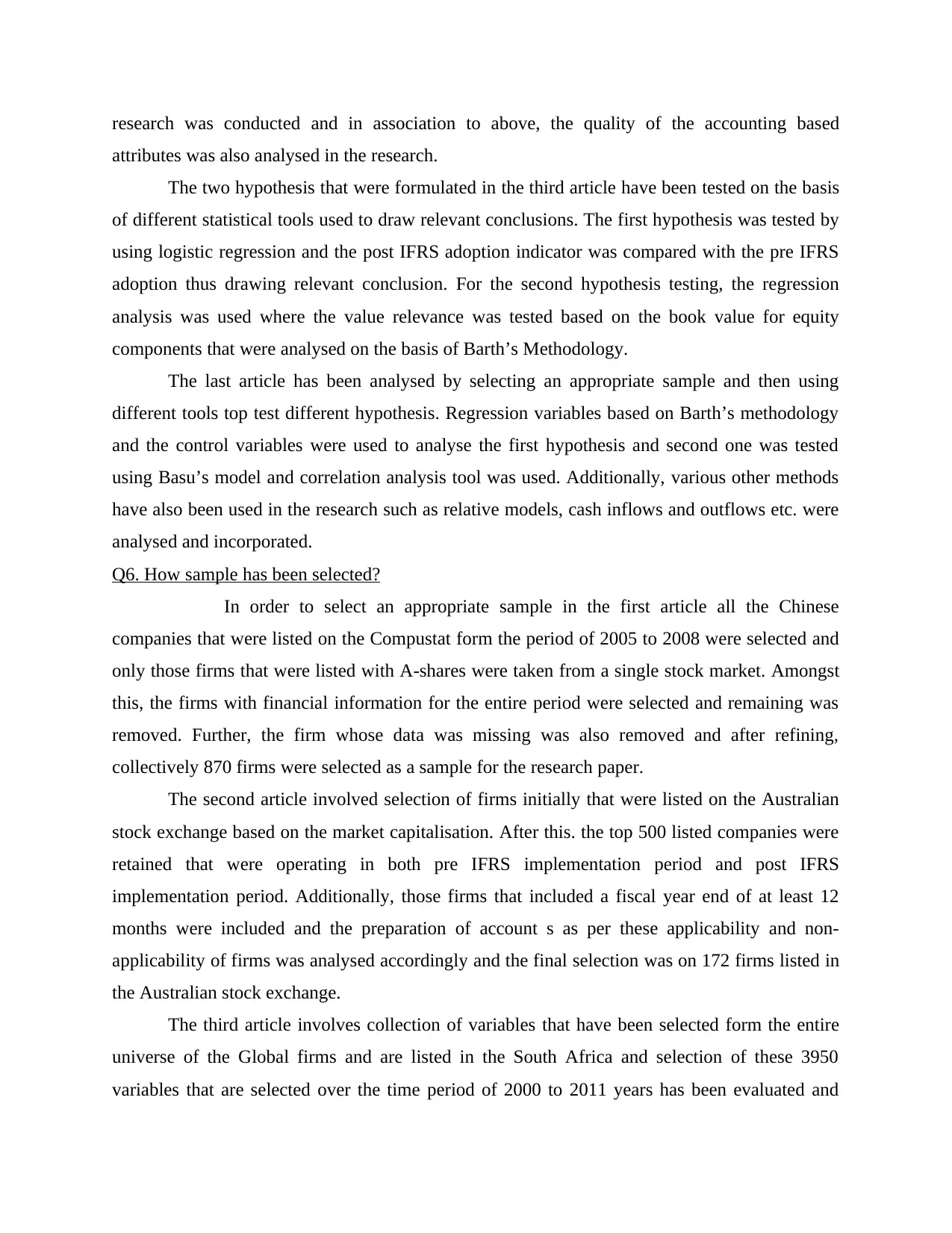
research was conducted and in association to above, the quality of the accounting based
attributes was also analysed in the research.
The two hypothesis that were formulated in the third article have been tested on the basis
of different statistical tools used to draw relevant conclusions. The first hypothesis was tested by
using logistic regression and the post IFRS adoption indicator was compared with the pre IFRS
adoption thus drawing relevant conclusion. For the second hypothesis testing, the regression
analysis was used where the value relevance was tested based on the book value for equity
components that were analysed on the basis of Barth’s Methodology.
The last article has been analysed by selecting an appropriate sample and then using
different tools top test different hypothesis. Regression variables based on Barth’s methodology
and the control variables were used to analyse the first hypothesis and second one was tested
using Basu’s model and correlation analysis tool was used. Additionally, various other methods
have also been used in the research such as relative models, cash inflows and outflows etc. were
analysed and incorporated.
Q6. How sample has been selected?
In order to select an appropriate sample in the first article all the Chinese
companies that were listed on the Compustat form the period of 2005 to 2008 were selected and
only those firms that were listed with A-shares were taken from a single stock market. Amongst
this, the firms with financial information for the entire period were selected and remaining was
removed. Further, the firm whose data was missing was also removed and after refining,
collectively 870 firms were selected as a sample for the research paper.
The second article involved selection of firms initially that were listed on the Australian
stock exchange based on the market capitalisation. After this. the top 500 listed companies were
retained that were operating in both pre IFRS implementation period and post IFRS
implementation period. Additionally, those firms that included a fiscal year end of at least 12
months were included and the preparation of account s as per these applicability and non-
applicability of firms was analysed accordingly and the final selection was on 172 firms listed in
the Australian stock exchange.
The third article involves collection of variables that have been selected form the entire
universe of the Global firms and are listed in the South Africa and selection of these 3950
variables that are selected over the time period of 2000 to 2011 years has been evaluated and
attributes was also analysed in the research.
The two hypothesis that were formulated in the third article have been tested on the basis
of different statistical tools used to draw relevant conclusions. The first hypothesis was tested by
using logistic regression and the post IFRS adoption indicator was compared with the pre IFRS
adoption thus drawing relevant conclusion. For the second hypothesis testing, the regression
analysis was used where the value relevance was tested based on the book value for equity
components that were analysed on the basis of Barth’s Methodology.
The last article has been analysed by selecting an appropriate sample and then using
different tools top test different hypothesis. Regression variables based on Barth’s methodology
and the control variables were used to analyse the first hypothesis and second one was tested
using Basu’s model and correlation analysis tool was used. Additionally, various other methods
have also been used in the research such as relative models, cash inflows and outflows etc. were
analysed and incorporated.
Q6. How sample has been selected?
In order to select an appropriate sample in the first article all the Chinese
companies that were listed on the Compustat form the period of 2005 to 2008 were selected and
only those firms that were listed with A-shares were taken from a single stock market. Amongst
this, the firms with financial information for the entire period were selected and remaining was
removed. Further, the firm whose data was missing was also removed and after refining,
collectively 870 firms were selected as a sample for the research paper.
The second article involved selection of firms initially that were listed on the Australian
stock exchange based on the market capitalisation. After this. the top 500 listed companies were
retained that were operating in both pre IFRS implementation period and post IFRS
implementation period. Additionally, those firms that included a fiscal year end of at least 12
months were included and the preparation of account s as per these applicability and non-
applicability of firms was analysed accordingly and the final selection was on 172 firms listed in
the Australian stock exchange.
The third article involves collection of variables that have been selected form the entire
universe of the Global firms and are listed in the South Africa and selection of these 3950
variables that are selected over the time period of 2000 to 2011 years has been evaluated and
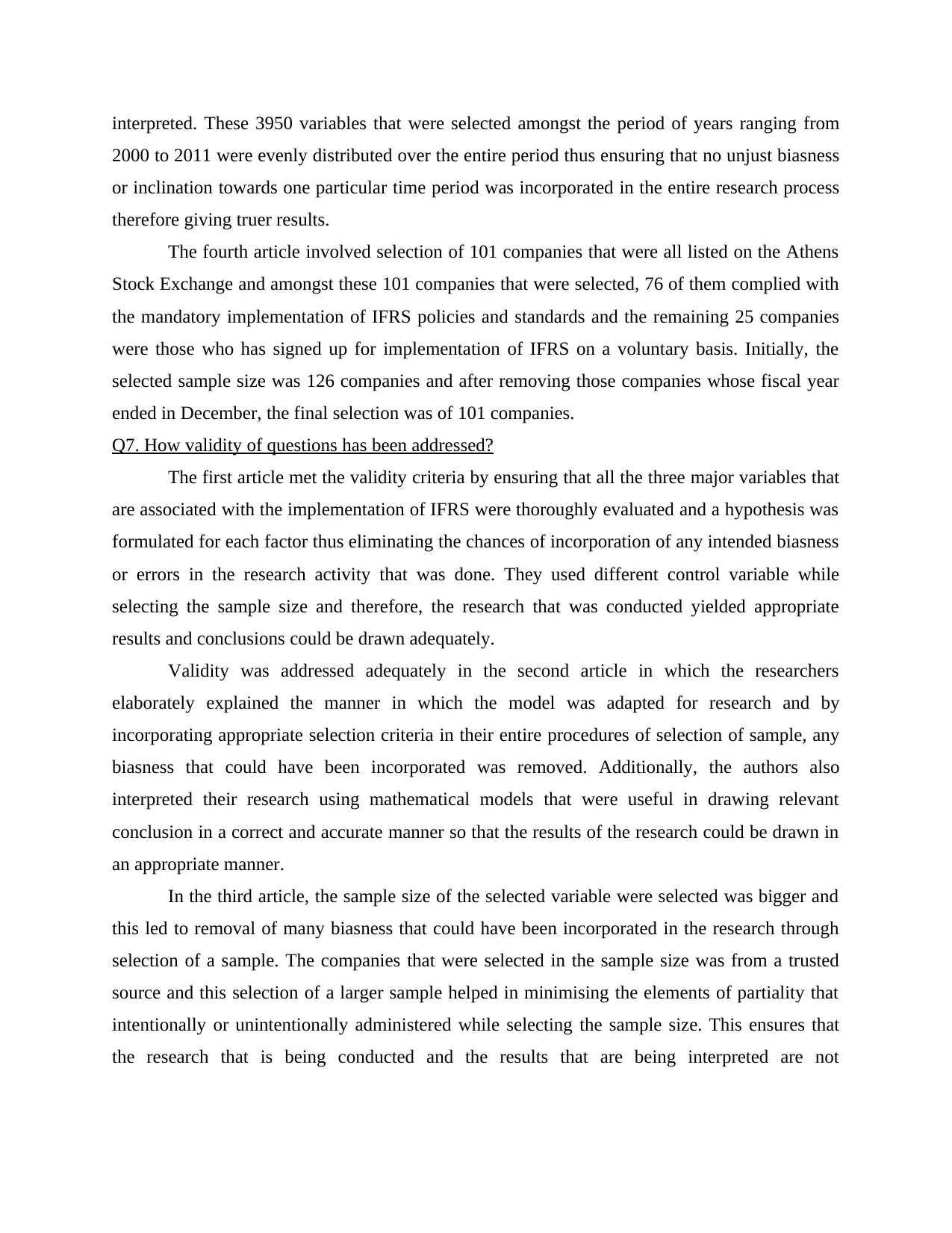
interpreted. These 3950 variables that were selected amongst the period of years ranging from
2000 to 2011 were evenly distributed over the entire period thus ensuring that no unjust biasness
or inclination towards one particular time period was incorporated in the entire research process
therefore giving truer results.
The fourth article involved selection of 101 companies that were all listed on the Athens
Stock Exchange and amongst these 101 companies that were selected, 76 of them complied with
the mandatory implementation of IFRS policies and standards and the remaining 25 companies
were those who has signed up for implementation of IFRS on a voluntary basis. Initially, the
selected sample size was 126 companies and after removing those companies whose fiscal year
ended in December, the final selection was of 101 companies.
Q7. How validity of questions has been addressed?
The first article met the validity criteria by ensuring that all the three major variables that
are associated with the implementation of IFRS were thoroughly evaluated and a hypothesis was
formulated for each factor thus eliminating the chances of incorporation of any intended biasness
or errors in the research activity that was done. They used different control variable while
selecting the sample size and therefore, the research that was conducted yielded appropriate
results and conclusions could be drawn adequately.
Validity was addressed adequately in the second article in which the researchers
elaborately explained the manner in which the model was adapted for research and by
incorporating appropriate selection criteria in their entire procedures of selection of sample, any
biasness that could have been incorporated was removed. Additionally, the authors also
interpreted their research using mathematical models that were useful in drawing relevant
conclusion in a correct and accurate manner so that the results of the research could be drawn in
an appropriate manner.
In the third article, the sample size of the selected variable were selected was bigger and
this led to removal of many biasness that could have been incorporated in the research through
selection of a sample. The companies that were selected in the sample size was from a trusted
source and this selection of a larger sample helped in minimising the elements of partiality that
intentionally or unintentionally administered while selecting the sample size. This ensures that
the research that is being conducted and the results that are being interpreted are not
2000 to 2011 were evenly distributed over the entire period thus ensuring that no unjust biasness
or inclination towards one particular time period was incorporated in the entire research process
therefore giving truer results.
The fourth article involved selection of 101 companies that were all listed on the Athens
Stock Exchange and amongst these 101 companies that were selected, 76 of them complied with
the mandatory implementation of IFRS policies and standards and the remaining 25 companies
were those who has signed up for implementation of IFRS on a voluntary basis. Initially, the
selected sample size was 126 companies and after removing those companies whose fiscal year
ended in December, the final selection was of 101 companies.
Q7. How validity of questions has been addressed?
The first article met the validity criteria by ensuring that all the three major variables that
are associated with the implementation of IFRS were thoroughly evaluated and a hypothesis was
formulated for each factor thus eliminating the chances of incorporation of any intended biasness
or errors in the research activity that was done. They used different control variable while
selecting the sample size and therefore, the research that was conducted yielded appropriate
results and conclusions could be drawn adequately.
Validity was addressed adequately in the second article in which the researchers
elaborately explained the manner in which the model was adapted for research and by
incorporating appropriate selection criteria in their entire procedures of selection of sample, any
biasness that could have been incorporated was removed. Additionally, the authors also
interpreted their research using mathematical models that were useful in drawing relevant
conclusion in a correct and accurate manner so that the results of the research could be drawn in
an appropriate manner.
In the third article, the sample size of the selected variable were selected was bigger and
this led to removal of many biasness that could have been incorporated in the research through
selection of a sample. The companies that were selected in the sample size was from a trusted
source and this selection of a larger sample helped in minimising the elements of partiality that
intentionally or unintentionally administered while selecting the sample size. This ensures that
the research that is being conducted and the results that are being interpreted are not
⊘ This is a preview!⊘
Do you want full access?
Subscribe today to unlock all pages.

Trusted by 1+ million students worldwide
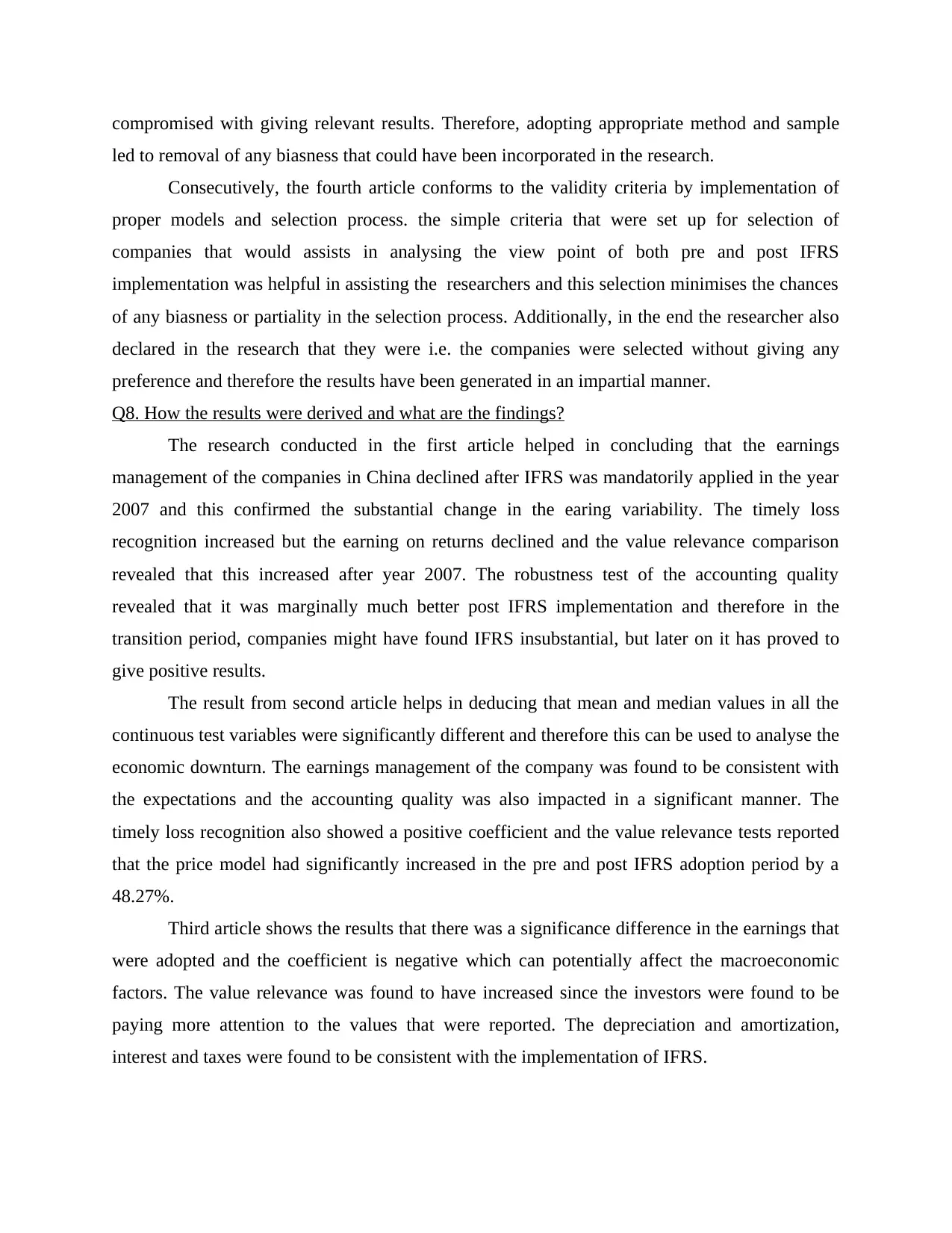
compromised with giving relevant results. Therefore, adopting appropriate method and sample
led to removal of any biasness that could have been incorporated in the research.
Consecutively, the fourth article conforms to the validity criteria by implementation of
proper models and selection process. the simple criteria that were set up for selection of
companies that would assists in analysing the view point of both pre and post IFRS
implementation was helpful in assisting the researchers and this selection minimises the chances
of any biasness or partiality in the selection process. Additionally, in the end the researcher also
declared in the research that they were i.e. the companies were selected without giving any
preference and therefore the results have been generated in an impartial manner.
Q8. How the results were derived and what are the findings?
The research conducted in the first article helped in concluding that the earnings
management of the companies in China declined after IFRS was mandatorily applied in the year
2007 and this confirmed the substantial change in the earing variability. The timely loss
recognition increased but the earning on returns declined and the value relevance comparison
revealed that this increased after year 2007. The robustness test of the accounting quality
revealed that it was marginally much better post IFRS implementation and therefore in the
transition period, companies might have found IFRS insubstantial, but later on it has proved to
give positive results.
The result from second article helps in deducing that mean and median values in all the
continuous test variables were significantly different and therefore this can be used to analyse the
economic downturn. The earnings management of the company was found to be consistent with
the expectations and the accounting quality was also impacted in a significant manner. The
timely loss recognition also showed a positive coefficient and the value relevance tests reported
that the price model had significantly increased in the pre and post IFRS adoption period by a
48.27%.
Third article shows the results that there was a significance difference in the earnings that
were adopted and the coefficient is negative which can potentially affect the macroeconomic
factors. The value relevance was found to have increased since the investors were found to be
paying more attention to the values that were reported. The depreciation and amortization,
interest and taxes were found to be consistent with the implementation of IFRS.
led to removal of any biasness that could have been incorporated in the research.
Consecutively, the fourth article conforms to the validity criteria by implementation of
proper models and selection process. the simple criteria that were set up for selection of
companies that would assists in analysing the view point of both pre and post IFRS
implementation was helpful in assisting the researchers and this selection minimises the chances
of any biasness or partiality in the selection process. Additionally, in the end the researcher also
declared in the research that they were i.e. the companies were selected without giving any
preference and therefore the results have been generated in an impartial manner.
Q8. How the results were derived and what are the findings?
The research conducted in the first article helped in concluding that the earnings
management of the companies in China declined after IFRS was mandatorily applied in the year
2007 and this confirmed the substantial change in the earing variability. The timely loss
recognition increased but the earning on returns declined and the value relevance comparison
revealed that this increased after year 2007. The robustness test of the accounting quality
revealed that it was marginally much better post IFRS implementation and therefore in the
transition period, companies might have found IFRS insubstantial, but later on it has proved to
give positive results.
The result from second article helps in deducing that mean and median values in all the
continuous test variables were significantly different and therefore this can be used to analyse the
economic downturn. The earnings management of the company was found to be consistent with
the expectations and the accounting quality was also impacted in a significant manner. The
timely loss recognition also showed a positive coefficient and the value relevance tests reported
that the price model had significantly increased in the pre and post IFRS adoption period by a
48.27%.
Third article shows the results that there was a significance difference in the earnings that
were adopted and the coefficient is negative which can potentially affect the macroeconomic
factors. The value relevance was found to have increased since the investors were found to be
paying more attention to the values that were reported. The depreciation and amortization,
interest and taxes were found to be consistent with the implementation of IFRS.
Paraphrase This Document
Need a fresh take? Get an instant paraphrase of this document with our AI Paraphraser
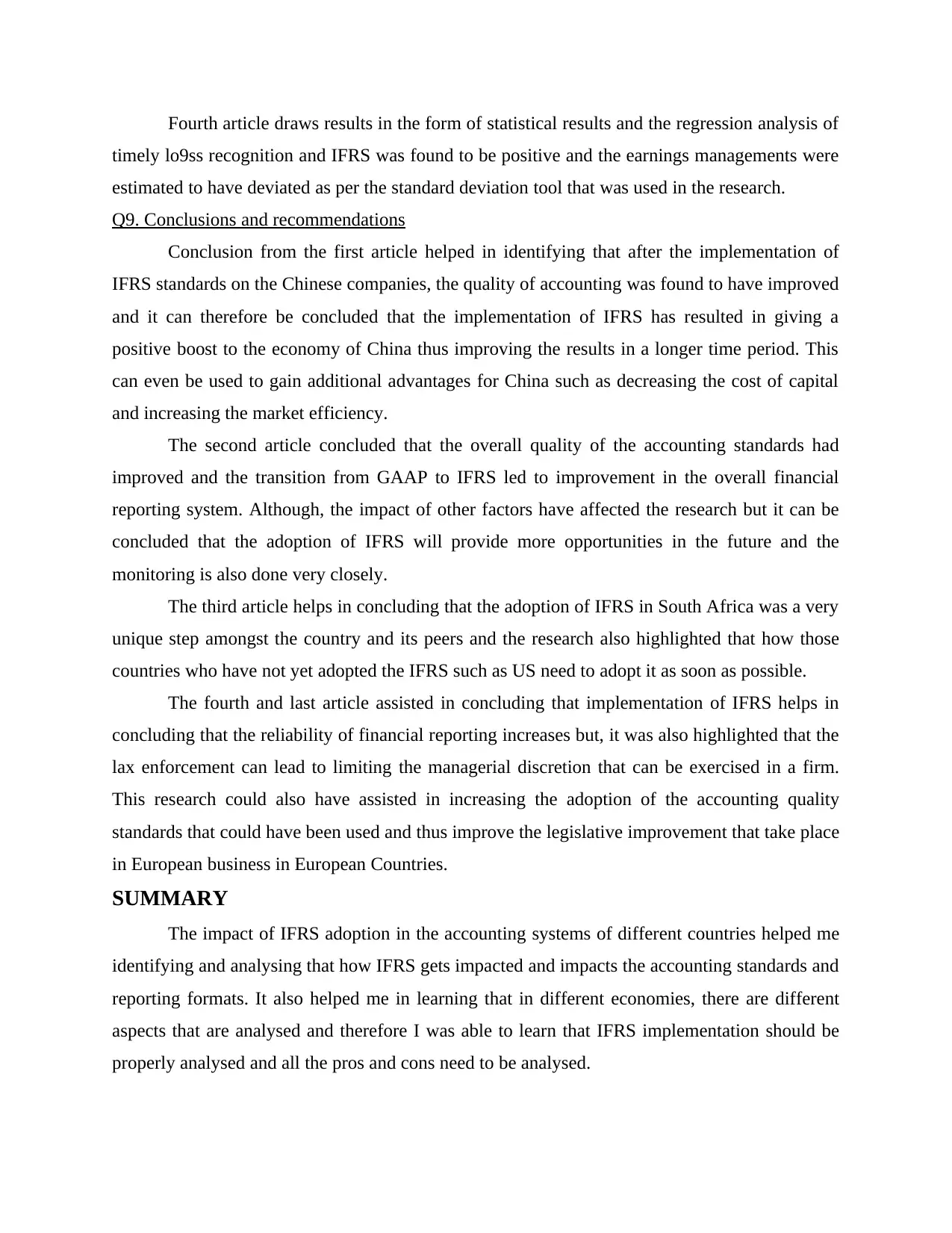
Fourth article draws results in the form of statistical results and the regression analysis of
timely lo9ss recognition and IFRS was found to be positive and the earnings managements were
estimated to have deviated as per the standard deviation tool that was used in the research.
Q9. Conclusions and recommendations
Conclusion from the first article helped in identifying that after the implementation of
IFRS standards on the Chinese companies, the quality of accounting was found to have improved
and it can therefore be concluded that the implementation of IFRS has resulted in giving a
positive boost to the economy of China thus improving the results in a longer time period. This
can even be used to gain additional advantages for China such as decreasing the cost of capital
and increasing the market efficiency.
The second article concluded that the overall quality of the accounting standards had
improved and the transition from GAAP to IFRS led to improvement in the overall financial
reporting system. Although, the impact of other factors have affected the research but it can be
concluded that the adoption of IFRS will provide more opportunities in the future and the
monitoring is also done very closely.
The third article helps in concluding that the adoption of IFRS in South Africa was a very
unique step amongst the country and its peers and the research also highlighted that how those
countries who have not yet adopted the IFRS such as US need to adopt it as soon as possible.
The fourth and last article assisted in concluding that implementation of IFRS helps in
concluding that the reliability of financial reporting increases but, it was also highlighted that the
lax enforcement can lead to limiting the managerial discretion that can be exercised in a firm.
This research could also have assisted in increasing the adoption of the accounting quality
standards that could have been used and thus improve the legislative improvement that take place
in European business in European Countries.
SUMMARY
The impact of IFRS adoption in the accounting systems of different countries helped me
identifying and analysing that how IFRS gets impacted and impacts the accounting standards and
reporting formats. It also helped me in learning that in different economies, there are different
aspects that are analysed and therefore I was able to learn that IFRS implementation should be
properly analysed and all the pros and cons need to be analysed.
timely lo9ss recognition and IFRS was found to be positive and the earnings managements were
estimated to have deviated as per the standard deviation tool that was used in the research.
Q9. Conclusions and recommendations
Conclusion from the first article helped in identifying that after the implementation of
IFRS standards on the Chinese companies, the quality of accounting was found to have improved
and it can therefore be concluded that the implementation of IFRS has resulted in giving a
positive boost to the economy of China thus improving the results in a longer time period. This
can even be used to gain additional advantages for China such as decreasing the cost of capital
and increasing the market efficiency.
The second article concluded that the overall quality of the accounting standards had
improved and the transition from GAAP to IFRS led to improvement in the overall financial
reporting system. Although, the impact of other factors have affected the research but it can be
concluded that the adoption of IFRS will provide more opportunities in the future and the
monitoring is also done very closely.
The third article helps in concluding that the adoption of IFRS in South Africa was a very
unique step amongst the country and its peers and the research also highlighted that how those
countries who have not yet adopted the IFRS such as US need to adopt it as soon as possible.
The fourth and last article assisted in concluding that implementation of IFRS helps in
concluding that the reliability of financial reporting increases but, it was also highlighted that the
lax enforcement can lead to limiting the managerial discretion that can be exercised in a firm.
This research could also have assisted in increasing the adoption of the accounting quality
standards that could have been used and thus improve the legislative improvement that take place
in European business in European Countries.
SUMMARY
The impact of IFRS adoption in the accounting systems of different countries helped me
identifying and analysing that how IFRS gets impacted and impacts the accounting standards and
reporting formats. It also helped me in learning that in different economies, there are different
aspects that are analysed and therefore I was able to learn that IFRS implementation should be
properly analysed and all the pros and cons need to be analysed.
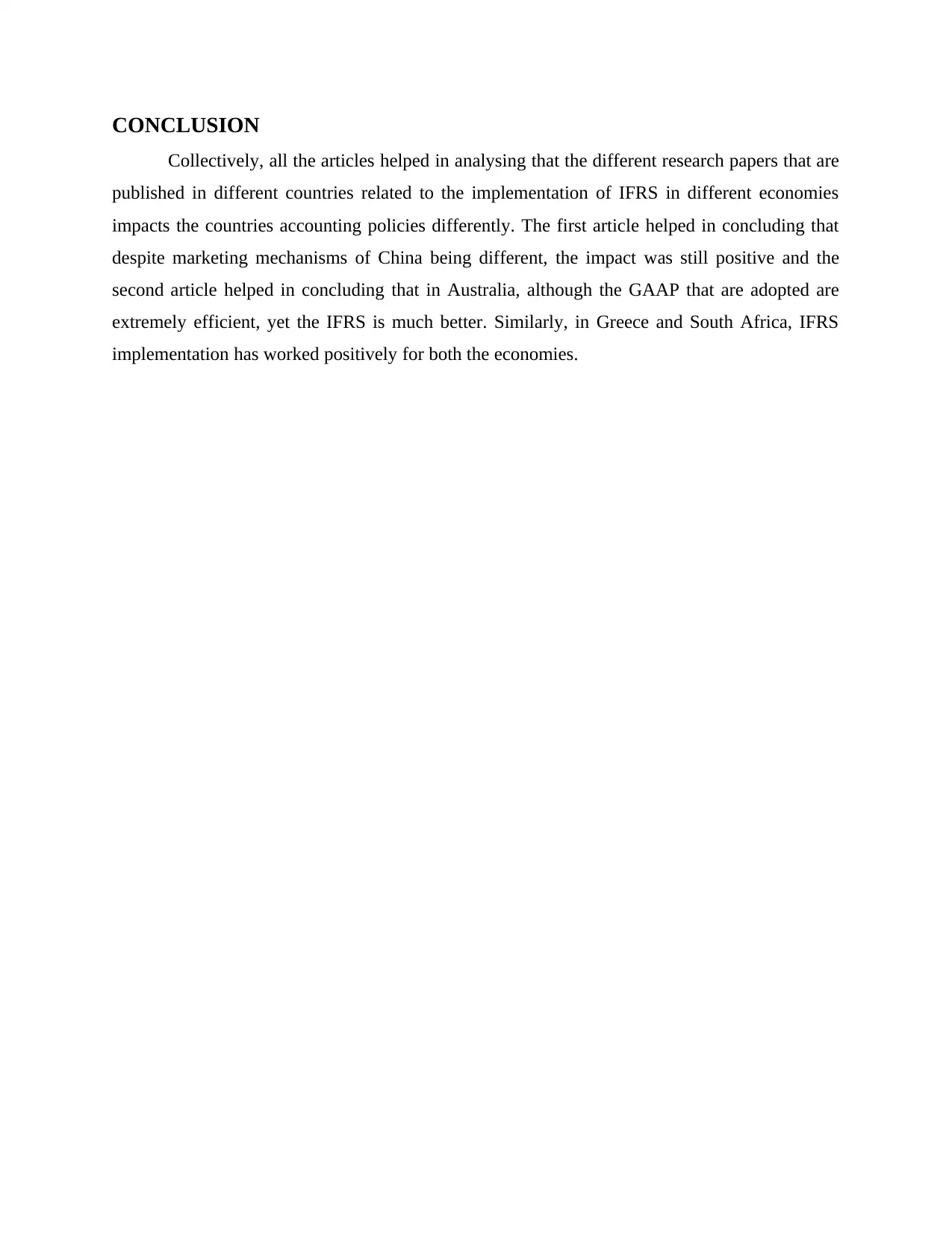
CONCLUSION
Collectively, all the articles helped in analysing that the different research papers that are
published in different countries related to the implementation of IFRS in different economies
impacts the countries accounting policies differently. The first article helped in concluding that
despite marketing mechanisms of China being different, the impact was still positive and the
second article helped in concluding that in Australia, although the GAAP that are adopted are
extremely efficient, yet the IFRS is much better. Similarly, in Greece and South Africa, IFRS
implementation has worked positively for both the economies.
Collectively, all the articles helped in analysing that the different research papers that are
published in different countries related to the implementation of IFRS in different economies
impacts the countries accounting policies differently. The first article helped in concluding that
despite marketing mechanisms of China being different, the impact was still positive and the
second article helped in concluding that in Australia, although the GAAP that are adopted are
extremely efficient, yet the IFRS is much better. Similarly, in Greece and South Africa, IFRS
implementation has worked positively for both the economies.
⊘ This is a preview!⊘
Do you want full access?
Subscribe today to unlock all pages.

Trusted by 1+ million students worldwide
1 out of 14
Related Documents
Your All-in-One AI-Powered Toolkit for Academic Success.
+13062052269
info@desklib.com
Available 24*7 on WhatsApp / Email
![[object Object]](/_next/static/media/star-bottom.7253800d.svg)
Unlock your academic potential
Copyright © 2020–2026 A2Z Services. All Rights Reserved. Developed and managed by ZUCOL.





